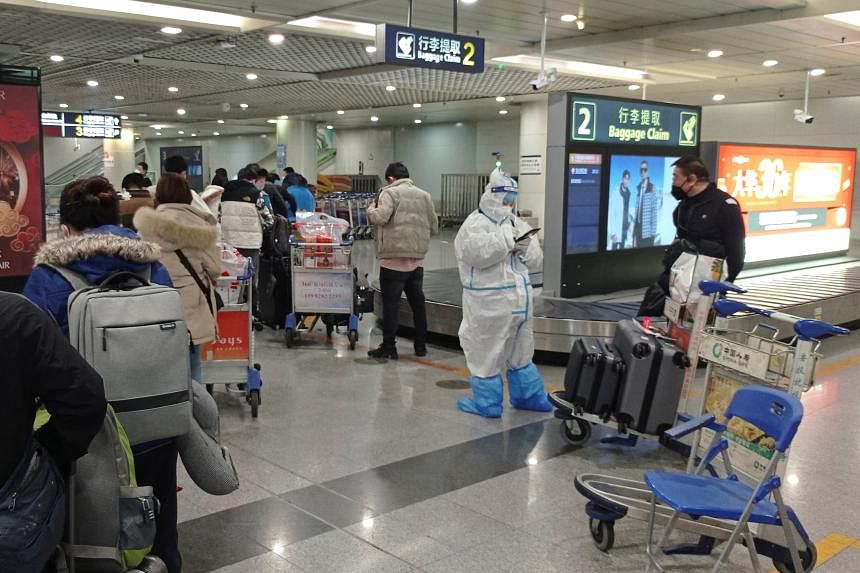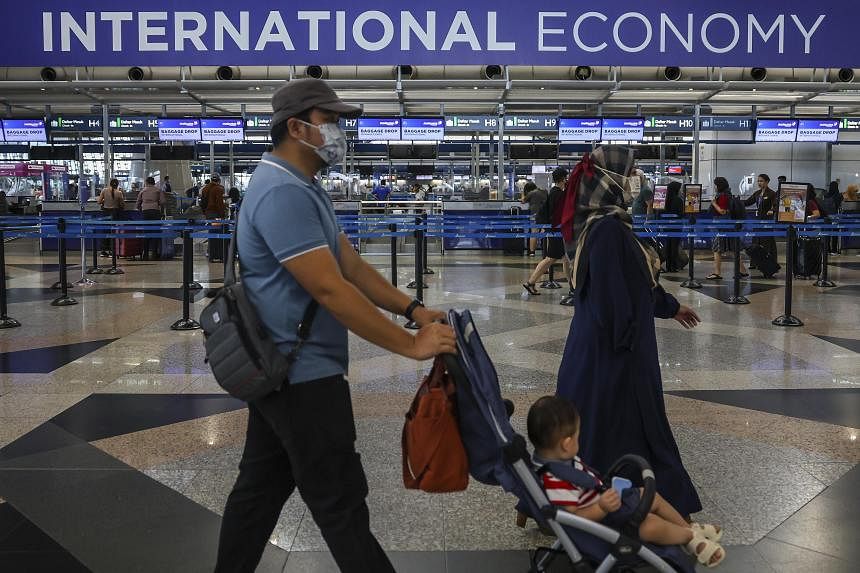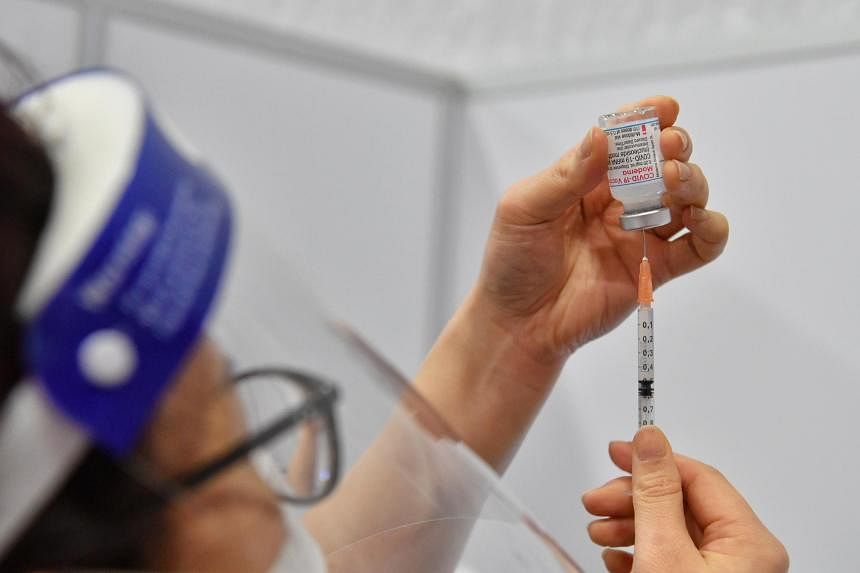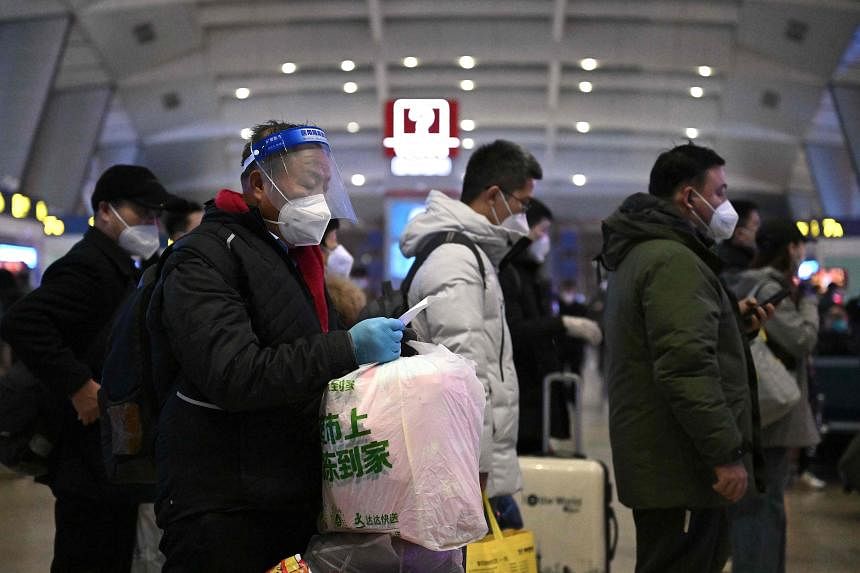Business missions, leisure travel between Singapore and China poised to restart as curbs ease
Travellers at the international airport in Chengdu, China, on Friday. China will open its borders on Sunday. PHOTO: REUTERS
Ng Wei Kai and
Tan Dawn Wei
JAN 7, 2023
SINGAPORE – At least four business missions between Singapore and China will take place over the next three months as travel between the two countries restarts following three disrupted years due to the Covid-19 pandemic.
The Singapore Chinese Chamber of Commerce and Industry (SCCCI) said the moves follow many requests from various Chinese government agencies to reconnect in 2023.
From Sunday, China
will open its borders and relax requirements, which currently require travellers to quarantine at a hotel or other facility for at least the first five days after arrival.
Mr Edward Ang, the chairman of SCCCI’s international affairs committee, said: “Provincial governments have been actively organising upcoming visits to Singapore, together with China companies, searching for new cooperation opportunities.”
In anticipation of travel curbs easing, connectivity between the two countries has gradually been re-established.
On Dec 27, 2022, Singapore Airlines (SIA) announced it
would restart flights to Beijing from the Republic, on a fortnightly basis. Such flight services had been suspended since March 2020 – the height of the pandemic.
This came after the airline reinstated flights from Beijing to Singapore on Sept 27, with flights operating twice-weekly. SIA also flies to and from Shanghai on Mondays and Saturdays.
Mr Ang added that, in response to this development, SCCCI is monitoring the situation and considering organising more business missions to China when borders are fully open.
Chinese citizens are looking forward to return to Singapore for work and leisure.
Among them is Beijing-based wine importer Colin Li, 35, who is planning a trip in April or May.
But he has to first renew his passport, which expired in 2021. China suspended passport renewal for non-essential travel in July 2021 to prevent new Covid-19 variants from being brought into the country.
The Chinese immigration authority said recently it will resume granting new passports to Chinese citizens who wish to travel.
Mr Li is keen to visit the island-state for the first time to explore business opportunities and possibly use Singapore as a base to market his brand of baijiu, a liquor that is considered China’s national drink, to the rest of South-east Asia.
The last time he left China was for a work trip to Italy in 2019.
His business in China took multiple hits in the past three years, with the folding of many restaurants and the collapse of the consumer market as China imposed a strict zero-Covid policy. Then, international shipping costs soared because of the pandemic.
“At its highest, I was paying 10 times more than usual,” Mr Li said.
In 2023, he has been snared by global inflation.
“I hear there is a good market in Singapore, given the large ethnic Chinese population and number of immigrants from China. So we want to target Singapore first before expanding out to the region,” he said.
Mr Li, who recovered from Covid-19 two weeks ago, is not worried about catching a different variant in Singapore.
Another Beijing-based resident is Ms Liu Yue, 26, who has just recovered from Covid-19 and said she is still feeling a little weak.
“But once I think my body’s defences are up again, I think it’s time to go see the world again. It’s been too long.”
The marketing executive has been eyeing Singapore as a destination since seeing a short video clip on Douyin – China’s version of TikTok – that featured the Marina Bay skyline more than a year ago. She heard the Republic is “fun, with great food and shopping, but expensive”.
Her passport too expired in 2021, and she has not been out of the country since a trip to Seoul with her family in early 2019.
The Singapore Tourism Board (STB) said mainland China remains an important market for the country.
Its executive director for Greater China, Mr Andrew Phua, said: “Throughout the pandemic, STB has continued to build affinity for Singapore as a destination among Chinese travellers.”
“With China reopening borders from Jan 8 and imminent outbound travel in due time, STB is partnering with Chinese travel company CTrip to launch a joint marketing campaign with a greater focus on quality and premium experiences for forward bookings,” he added.
Said Mr Phua: “This is the first promotional destination campaign by STB and CTrip since China’s latest announcement.”
He added that STB will gear up for the resumption of outbound travel from China by continuing marketing and trade engagement efforts.
The resumption of flights to the Chinese capital is also a boon for Beijing natives living in Singapore.
Student Shilin Guan, 18, said she had been looking forward to flights restarting as most of her family is based there.
“The flights will make everything convenient, because previously if I wanted to go to Beijing, I’d have to land in another city and quarantine there and then fly to Beijing and do another round of quarantine,” she said.
“I know a lot of people from Beijing who haven’t gone home in years because of the indirect flight situation.”





